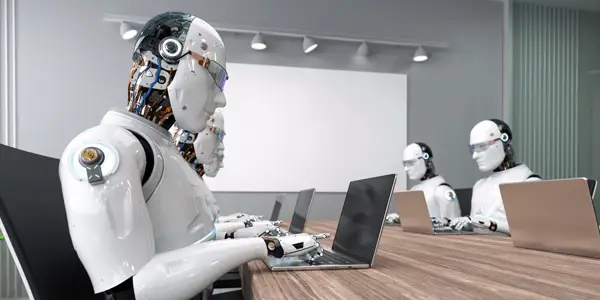How Do AI and Automation Impact Talent Acquisition?
As you know, AI and automation are revolutionizing many industries, and one of the trending news is that it will impact Talent Acquisition, including the hiring and recruitment process. While it may not replace recruiters, it may play a dominating role.
In this Aniday's guide, you will learn how AI will impact recruitment and hiring platforms and how to adopt it to survive in this technology era.
How Does Talent Acquisition Drive AI and Automation?
According to the "The Future of Recruiting 2024" blog analysis, Generative AI would greatly influence talent acquisition. So far, this is one of the most significant and essential predictions regarding the trends influencing talent acquisition.
John Vlastelica, CEO at Recruiting Toolbox, said, "For the first time in years, there's a fundamental shift coming to talent acquisition, and AI and automation drive it." This indicates there would be a turning and twisting point for recruiters when combining the critical technologies of AI and Automation in their work process.
Moreover, a survey was conducted among the talent professionals by LinkedIn, and here are the insights gathered from it:
- 27% indicate that they are either using or experimenting with Generative AI.
- 62% of recruiting pros have expressed optimism regarding AI's impact on recruitment.
- 6 out of 10 professionals are interested in recruitment using AI.
- According to the 2022 and 2023 Global LinkedIn data, 14% of recruiters added AI skills to their profiles in 2023.
Based on the above analysis and insights, recruiters should be proactive about adapting AI and automation in recruitment. To do so, you should be aware of the AI roles in recruitment, their benefits, challenges, and critical methods for effectively adapting to challenges. Let’s dive deeper into these topics with Aniday!

What Are The AI Roles In Recruitment?
Since AI will rule the era of recruitment in the upcoming years, you should be aware of the key emerging AI roles in recruitment. They include:
- AI recruitment specialist: These specialists will use AI-driven recruitment solutions to oversee candidates screen, source, and match job roles.
- Talent acquisition data analyst: This role would analyze data taken from AI-powered tools to gain insights into recruitment trends, candidate behavior, and hiring outcomes.
- AI integration consultant: Consultants would be helpful for junior recruiters, helping them use AI tools to meet hiring objectives.
- AI sourcing strategist: These professionals would use AI tools strategically for sourcing purposes, such as finding the ideal candidate match through social media, job boards, and databases, while automating this process effectively.
- AI ethics and compliance officer: When companies use AI tools, it's essential to safeguard the ethics and privacy of the information. Hence, AI ethics and compliance officers ensure compliance with regulations based on how they use the data.
What Are The Benefits Of AI in Recruitment?
Using AI and automation in recruitment will help streamline the workflow while increasing the efficiency and effectiveness of the workload. Aniday has gathered key benefits of using AI in recruiting:
- Ability to assess talents: AI-powered talent assessment tools help analyze candidates, their skills, personality traits, behavioral assessment, and skill testing. It would be helpful to get detailed reports on each candidate and make informed decisions about hiring the right candidate.
- Create a personalized onboarding process: A positive first impression is essential for candidate onboarding. Thus, AI-based tools will help provide a customized onboarding experience for new employees.
- Easy candidate sourcing process: AI-based sourcing software helps recruiters use AI algorithms and machine learning to automate sourcing activities. Thus, finding ideal candidates based on the requirements is easy and effective.
- Effective candidate screening methodologies: Candidate screening is a time-consuming task for recruiters. However, using AI helps sift through the pool of applications and find the top candidates accurately and efficiently.
- Understand candidates in depth based on candidate interviews: AI-based interview platforms are handy for performing pre-screening interviews via video calls and text-based interactions. These platforms use voice and facial analysis to identify the candidate's emotional state, answers, tone, and fit for the role.

What Are The Challenges Of AI in Recruitment?
Even though using AI in recruitment is easy and effective, it brings many challenges for employers, recruiters, and candidates. However, there are ways to mitigate these challenges, such as using AI in recruitment. Join Aniday as we dive into the details!
Data Privacy Concerns
When AI is used in recruiting, it may raise privacy and security issues related to candidate data. Hence, companies should know this concern and learn to handle candidates and their personal information effectively.
Solution: Companies can monitor regulations related to data protection, such as GDPR and CCPA. A dedicated employee should be responsible for complying with the rules and taking robust data protection measures, such as tight database login considerations, encryption, and regular audits.
AI Algorithms Causing Bias
It is essential to remember that AI systems are just tools and may even have accuracy issues. Ensuring that AI systems effectively ensure accuracy helps overcome bias problems.
Solution: The recruiter must be watchful for biases, prevent hiring practices, and review AI decisions without being wholly dependent. Conducting audits of AI systems will also help detect bias.
Fear Of Job Loss
Recruiters or HR professionals may fear AI will overrule their jobs and lead to job downfalls. But let's remember that AI tools cannot replace human decision-making and have limitations.
Solutions: Conduct regular workshops to help recruiters understand the limitations of AI tools. It is essential to understand the importance of human decision-making and prioritize it.
High Initial Cost
The initial investment in AI recruiting software can be extensive. However, evaluating the long-term benefits and the need to adapt to new technologies to achieve effective recruitment workflows is crucial.
Solution: Such companies planning to integrate AI recruiting software can prepare to allocate some funds from now on and think about the long-term cost savings as it reduces the hire time and ensures quality hires.
Final Thoughts
In conclusion, AI will play a critical role in talent acquisition and recruitment. But fear not, you can learn how to use these technologies and add to your skillset to stand out in the market.
If you are looking for Executive Search Services, Aniday provides excellence at this service at your fingertips to help you find ideal talents based on your requirements. Connect with us directly or connect with our expert headhunters today!
We hope this guide was helpful for you to understand how AI impacts talent acquisition.
Aniday's HR Services
Headhunting Service
Find and recruit quality candidates in just 1 week! Supported by 40,000 experienced headhunters in IT, Finance, Marketing… capable of recruiting in any region.
Headhunting Service ➔Employer of Record (EOR) Service
On behalf of your business, we recruit employees and handle payroll without the need to establish a company in markets such as Vietnam, Singapore, Malaysia, India, Indonesia…
Employer of Record (EOR) Service ➔